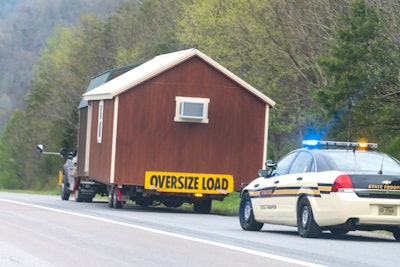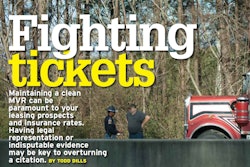The Trucking Law segment is a monthly feature on Overdrive, in which we pose commonly asked questions from truckers and owner-operators to legal experts. In this installment, attorney Brad Klepper talks about how COVID-19 is impacting law enforcement. Find all Trucking Law installments via this link.
 Court dates for handling traffic citations are being pushed backed for months due to delays caused by the coronavirus spread.
Court dates for handling traffic citations are being pushed backed for months due to delays caused by the coronavirus spread.Q. With widespread shelter-in-place orders and fewer vehicles on the road, how has law enforcement been affected?
A. For truck drivers used to dealing with congestion, the noticeable reduction of four-wheelers – and, to a lesser extent, commercial trucks – is welcome relief. One way of interpreting the change would be that with fewer four-wheelers in play, trucks would receive more than their normal share of tickets. However, this doesn’t appear to be the case.
Highway law enforcement officers have a new reality. They are working with commercial drivers to ensure that essential goods and services are delivered. Sure, they may still write a citation and make an arrest where needed, but apparently fewer tickets are being written as everyone – trucking, enforcement and regulators – is pulling on the same rope. In fact, I know of a police department that’s offered to deliver food to a rest stop outside of town. Who would have thought we would see that a year ago?
 Brad Klepper is president of Interstate Trucker, a law firm dedicated to defending drivers. He is also president of the discount services firm Drivers Legal Plan. He can be reached at 800-333-3748, InterstateTrucker.com and DriversLegalPlan.com.
Brad Klepper is president of Interstate Trucker, a law firm dedicated to defending drivers. He is also president of the discount services firm Drivers Legal Plan. He can be reached at 800-333-3748, InterstateTrucker.com and DriversLegalPlan.com.Q. If I am issued a ticket, do I have to sign it?

A. A traffic ticket means nothing until it becomes a conviction. It’s primarily just the officer’s opinion that you violated the law. It is not proof, or even a piece of evidence. It’s only a note to the officer to help him have in court the information he had at the scene, such as your CDL number and name.
It’s also a note to you that you have a scheduled court date where you will be responsible for entering one of three pleas: You can plead guilty and pay the fine. Or, to avoid a guilty plea, which could be used against you should civil litigation arise, you can plead no contest and pay the fine. Finally, you can plead not guilty and either have a hearing or set a date for a hearing.
When you sign the ticket, you are promising to either appear or resolve this matter with the court and then you are released on your own recognizance. By signing the ticket, you are not pleading guilty, you are only acknowledging receipt of the notice of your court date. The one possible exception is New Mexico, where the ticket form includes a separate, optional line for pleading guilty.
You are free to refuse to sign a ticket. Your refusal does not change your court date or your obligation to resolve the matter with the judge. Often the officer will simply note on the ticket your refusal to sign.
However, since a traffic ticket is a criminal matter, the officer has the authority to take you into custody. So bear in mind that your refusal, depending upon your attitude, may end with a trip to the police station.
Q. How is COVID-19 impacting the courts?
A. Courts are suspending jury trials, pushing back court dates, prohibiting “in person” hearings. If you’re scheduled for any kind of legal appearance, you should check the jurisdiction for its status.
All this comes at a time when the courts already had a substantial backlog. Some courts are pushing dates out eight weeks, some are pushing them out indefinitely. All the while, enforcement officers are still writing tickets and making arrests.
It’s not just highway-related cases that are affected. The immigration courts, whose backlog is legendary, are basically at a standstill. In the juvenile court system, some defendants may turn 18 before their case is processed, meaning the matter is never heard.
Extending the backlogs of court dates is problematic, but it’s the right thing to do to protect each other. These times are forcing many concessions, including the right to a speedy trial. Everyone needs to exhibit a little patience – with the courts, with drivers, with law enforcement, with each other. Hopefully we will all come out on the other side of this crisis with a little more understanding and appreciation for each other.








